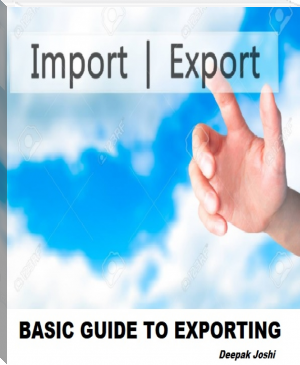BASIC GUIDE TO EXPORTING, DEEPAK JOSHI [i can read with my eyes shut TXT] 📗

- Author: DEEPAK JOSHI
Book online «BASIC GUIDE TO EXPORTING, DEEPAK JOSHI [i can read with my eyes shut TXT] 📗». Author DEEPAK JOSHI
Delivered ex works
This minimal obligation requires the seller only to make the goods available to the buyer at the seller's premises or factory. The seller is not responsible for loading the goods on the vehicle provided by the buyer, unless otherwise agreed. The buyer bears all responsibility for transporting the goods from the seller's place of business to their destination.
Ex works (EXW)
The price quoted applies only at the point of origin and the seller agrees to place the goods at the disposal of the buyer at the specified place on the date or within the period fixed. All other charges are for the account of the buyer.
Free alongside ship (FAS)
The seller quotes a price for the goods that includes charges for delivery of the goods alongside a vessel at the port. The seller handles the cost of unloading and wharfage; loading, ocean transportation, and insurance are left to the buyer.
Free carrier (FCA)
Recognizing the requirements of modern transport, including multi-modal transport, this principle is similar to free on board (see below), except that the exporter's obligations are met when the goods are delivered into the custody of the carrier at the named port. The risk of loss/damage is transferred to the buyer at this time, not at the ship's rail. The carrier can be any person contracted to transport the goods by road, sea, air, rail or a combination thereof.
Free of particular average (FPA)
This type of transportation insurance provides the narrowest type of coverage: total losses, and partial losses at sea if the vessel sinks, burns or is stranded, are covered.
Free on board (FOB)
The goods are placed on board the vessel by the seller at the port of shipment specified in the sales contract. The risk of loss or damage is transferred to the buyer when the goods pass the ship's rail.
Free on board airport (FOB airport)
Based on the same principles as the ordinary FOB expression, the seller's obligation is fulfilled by delivering the goods to the air carrier at the specified airport of departure, at which point the risk of loss or damage is transferred to the buyer.
Free on rail (FOR) and free on truck (FOT)
Again, the same principles apply as in the case of ordinary FOB, except that the goods are transported by rail or road.
With average (WA)
This type of transportation insurance provides protection from partial losses at sea.
v Transportation and delivery terms
The following are common terms used in packing, labelling, transporting and delivering goods to international markets. They are in addition to the above Incoterms.
Area control list
A list of countries to which any export (except humanitarian items) requires an export permit.
Bill of lading (ocean or airway)
A contract prepared by the carrier or the freight forwarder with the owner of the goods. The foreign buyer needs this document to take possession of the goods.
Certificate of origin
A document that certifies the country where the product was made (i.e. its origin). A common export document, a certificate of origin is needed when exporting to many foreign markets. It must be used for Canadian-made goods to qualify for preferential tariff treatment under the North American Free Trade Agreement.
Commercial invoice
A document prepared by the exporter or freight forwarder, and required by the foreign buyer, to prove ownership and arrange for payment to the exporter. It should provide basic information about the transaction, including description of goods, address of shipper and seller as well as delivery and payment terms. In some cases, the commercial invoice is used to assess customs duties.
Consular invoice
A statement issued by a foreign consul in the exporting nation describing the goods purchased. Some foreign governments require Canadian exporters to first obtain consular invoices from their consulate in Canada. A fee is usually charged.
Customs declaration
A document that traditionally accompanies exported goods bearing such information as the nature of the goods, their value, the consignee and their ultimate destination. Required for statistical purposes, it accompanies all controlled goods being exported under the appropriate permit.
Customs invoice
A document used to clear goods through customs in the importing country by providing documentary evidence of the value of goods. In some cases, the commercial invoice may be used for this purpose.
Dock receipt
A receipt issued by an ocean carrier to acknowledge receipt of a shipment at the carrier's dock or warehouse facilities. (See also, Warehouse receipt)
Ex factory
Used in price quotations, an expression referring to the price of goods at the exporter's loading dock.
Export control list
A list of goods and technologies that require export permits to be exported from Canada, pursuant to the Export and Import Permits Act.
Export permit
A legal document that is necessary for the export of goods controlled by the Government of Canada, specifically goods included on the Export Control List (see above) or goods destined for countries on the Area Control List).
Freight forwarder
A service company that handles all aspects of export shipping for a fee.
Insurance certificate
A document prepared by the exporter or freight forwarder to provide evidence that insurance against loss or damage has been obtained for the goods.
Landed cost
The cost of the exported product at the port or point of entry into the foreign market, but before the addition of foreign tariffs, taxes, local packaging/assembly costs and local distributors' margins. Product modifications made prior to shipment are included in the landed cost.
Packing list
A document prepared by the exporter showing the quantity and type of merchandise being shipped to the foreign customer.
Pro forma invoice
An invoice prepared by the exporter prior to shipping the goods, informing the buyer of the goods to be sent, their value and other key specifications.
Quotation
An offer by the exporter to sell the goods at a stated price and under certain conditions.
Warehouse receipt
A receipt identifying the commodities deposited in a recognized warehouse. A non-negotiable warehouse receipt specifies to whom the deposited goods will be delivered or released. A negotiable receipt states that the commodities will be released to the bearer of the receipt.
v Financial and insurance terms
The following are the most commonly used terms in international trade financing.
All risk
This is the most comprehensive type of transportation insurance, providing protection against all physical loss or damage from external causes.
Bid bond
When an exporter is bidding on a foreign contract, a bid bond guarantees that the exporter will take the contract if the bid succeeds. An exporter who refuses the contract must pay a penalty equal to the amount of the bond.
Cash in advance (advance payment)
A foreign customer pays a Canadian exporter prior to actually receiving the exporter's product(s). This form of payment carries the least risk from the exporter's perspective.
Confirming house
A company, based in a foreign country, that acts as a foreign buyer's agent and places confirmed orders with Canadian exporters. A confirming house guarantees payment to the exporters.
Consignment
Delivery of merchandise to the buyer or distributor, whereby the latter agrees to sell it and only then pay the Canadian exporter. The seller retains ownership of the goods until they are sold, but also carries all of the financial burden and risk.
Document of title
A document that provides evidence of entitlement to ownership of goods, e.g. carrier's bill of lading.
Documentary collection
The exporter ships the goods to the foreign buyer without a confirmed letter of credit or any other form of payment guarantee.
Documentary credit (sight and term)
A documentary credit calling for a sight draft means the exporter is entitled to receive payment on sight, i.e. upon presenting the draft to the bank. A term documentary credit may allow for payments to be made over a term of 30, 60 or 90 days, or at some other specified future date.
Draft (bill of exchange)
A written, unconditional order for payment from one party (the drawer) to another (the drawee). It directs the drawee to pay an indicated amount to the drawer. A sight draft calls for immediate payment. A term draft requires payment over a specified period.
Export financing house
A company that purchases a Canadian exporter's foreign receivables on a non-recourse basis upon presentation of proper documentation. It then organizes export arrangements and provides front-end financing to the foreign buyer.
Factoring house
A company that buys export receivables at a discount.
Letter of credit (L/C)
An instrument issued by a bank on behalf of an importer that guarantees payment to the exporter for goods or services, provided the terms of the credit are met.
Letter of credit (confirmed)
A Canadian bank confirms the validity of a letter of credit issued by a foreign bank on behalf of the foreign importer, guaranteeing payment to the Canadian exporter provided that all terms in the document have been met. An unconfirmed letter of credit does not guarantee payment so, if the foreign bank defaults, the Canadian exporter will not be paid. Canadian exporters should accept only confirmed letters of credit as a form of payment.
Letter of credit (Irrevocable)
A financial institution agrees to pay an exporter once all terms and conditions of the transaction are met. No terms or conditions can be modified without consent of all parties.
Open account
An arrangement in which goods are shipped to the foreign buyer before the Canadian exporter receives payment.

CONCLUSION..

CONCLUSION .......
Globalization is risky, no matter what. Failure to take the right steps early on can cause a much faster collapse in international markets than what we’d see domestically. The demands that global markets place on teams will change, so your group will need to be well-equipped for what’s around the corner. Being prepared for every scenario will help your company confidently tackle these challenges, so it’s important to educate your team. Transparency is critical, Patel adds. “Another key to overcoming resistance is always being honest and realistic about outcomes and situations. At the end of the day, it is your credibility that people trust and sometimes helps with the unknown.”
Just DO IT…
Don’t wait until you have a fully substantiated treatise before you start. Doing it will give you the experience and training you need to be sharper in other circumstances. It will refine your sense for doing business with another culture not familiar to you.
Are your bags packed or are you still hugging the shores? GOOD LUCK....

Imprint
Publication Date: 01-20-2021
All Rights Reserved
Dedication:
A Basic Guide to Exporting has given companies the information they need to establish and grow their business in international markets. Whether you’re new to exporting or





Comments (0)